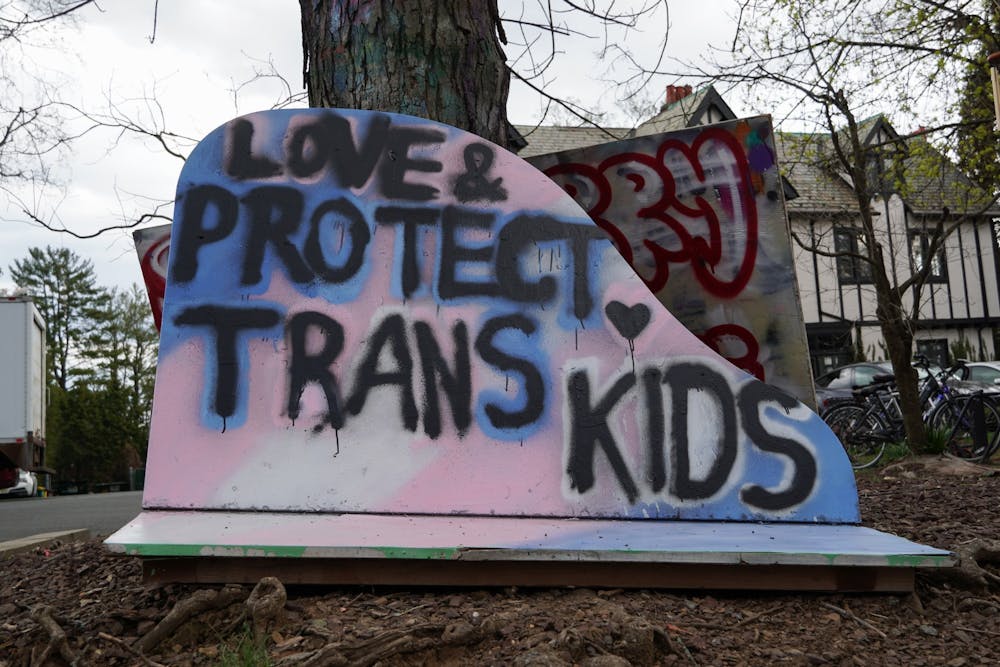Amidst a rising storm of anti-transgender legislation in states across the country, New Jersey — and Princeton — continue to provide available trans healthcare. Earlier this month, Governor Phil Murphy signed an executive order establishing New Jersey as a safe haven for gender-affirming healthcare. Here’s what you need to know about how Princeton’s Gender and Sexuality Resource Center (GSRC) and University Health Services (UHS) are responding.
“The GSRC is attuned to legislation across the country, including within our own state, that affects transgender students,” GSRC director Kristopher Oliveira wrote in a statement to The Daily Princetonian. “We are proud of Governor Murphy’s recent order to ensure that trans and nonbinary people in the state of New Jersey can continue to access lifesaving healthcare.”
So far in 2023, 494 anti-trans bills have been proposed in 47 states, according to the Trans Legislation Tracker. 39 passed, 92 failed, and 363 are currently active. In just one month in 2023, the United States doubled the number of anti-trans bills being considered across the country from the previous year. In 2022, 26 of the 174 bills proposed passed. According to the most recent ‘Prince’ Frosh Survey, about 12 percent of incoming Princeton students hail from states where anti-trans laws have been passed by state legislatures this year. According to the same survey, 1.4 percent of incoming Princetonians are trans.
Many bills are aimed at banning trans women from playing on female sports teams, barring trans youth from using bathrooms and locker rooms that align with their gender identity, putting restrictions on gender-affirming medical care. “Drag bans” targeted at gender-nonconforming performance have also been proposed in multiple states.
Murphy’s Executive Order No. 324, signed on April 4, directs all state departments and agencies to protect all persons, including health care professionals and patients, against potential repercussions resulting from providing, receiving, assisting in providing or receiving, seeking, or traveling to New Jersey to obtain gender-affirming health care services. The bill was signed alongside representatives from Garden State Equality and Bridges4Life, as well as LGBTQIA+ activists.
“Across the nation, we are witnessing attacks led by certain states that seek to undermine the equality, dignity, and safety of the LGBTQIA+ community, especially transgender and non-binary youth,” Murphy said about the bill. “As leaders, our greatest responsibility is ensuring that every person we represent, regardless of their gender identity or gender expression, is entitled to respect, fairness, and freedom.”
The UHS Trans Health Team expressed a similar dedication to ensuring equal access to health care services for trans and nonbinary individuals in a statement to the ‘Prince.’
“In line with the best practices developed by the world’s leading medical and psychological associations, UHS supports transgender and gender nonbinary (TGNB) students’ access to gender affirming care, including but not limited to the initiation and continuation of gender affirming hormones, as well as insurance coverage of surgeries and procedures for gender affirmation,” the UHS Trans Health Team wrote.
Students and dependents who seek gender-affirming health care can use medical services at UHS, including hormone therapy (HRT) consultation, initiation, and management. They can also find information about referrals for gender affirming surgeries, letters of support, consultations, and free, inclusive primary and sexual reproductive health care, according to UHS. Counseling and Psychological Services (CPS) also provides gender-affirming counseling and letters of support.
The UHS Trans Health Team exists to ensure that services offered at the University are “rooted in trauma-informed and gender affirming models of care and aims to improve services offered to transgender and gender diverse students and dependents.” The team consists of representatives across UHS departments, including Athletic Medicine, Health Promotion and Prevention Services (HPPS), the Infirmary, Student Health Plan Office, Medical Services, Information Technology, CPS, and Sexual Harassment/Assault Advising, Resources, and Education (SHARE).

The GSRC works with campus partners from UHS and CPS, along with academic departments at their request to improve the student experience and reduce barriers to access support or care, and to create inclusive classroom environments where all students have a “sense of belonging.”
In their statement to the ‘Prince,’ the Oliveira asked “each person to consider ‘what can you do to communicate to others in our community that they belong here?’”
Lia Opperman is an associate News editor for the ‘Prince.’
Please send any corrections to corrections[at]dailyprincetonian.com.








